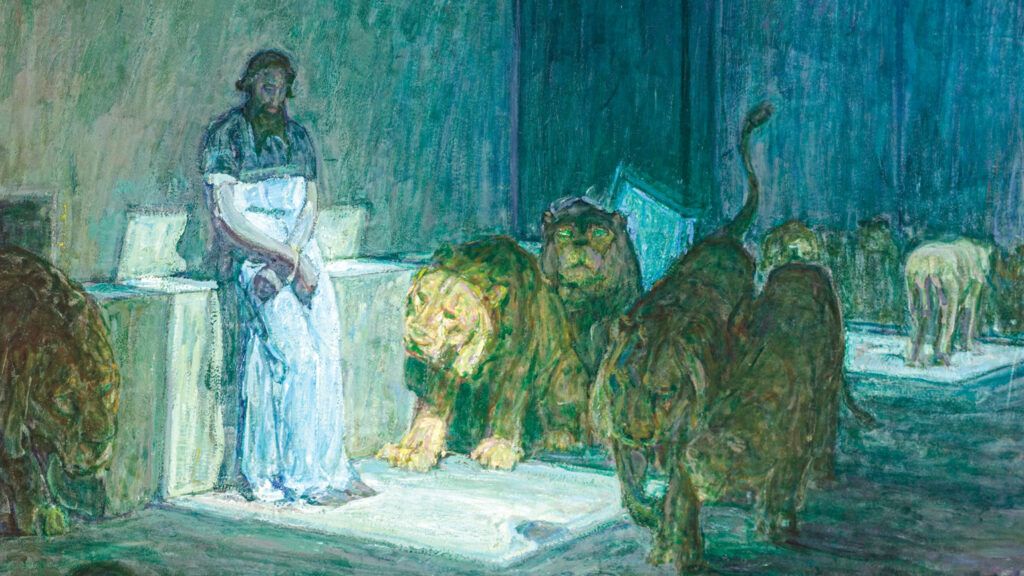I retired from Guideposts earlier this year. I feel fortunate to have worked for this wonderful organization for 36 years, writing articles, editing stories, encouraging other writers. Leaving wasn’t an easy decision, but I didn’t want to be that old dude hunched over a computer who needs to be told, “Hamlin, it’s time to make a change!” Besides, I wanted to be able to seek out other callings—new ways to help others.
Would I stop writing? Of course not. Writing is my delight. But I’m glad to have more time to run, pray, be with family and delve deeply into Scripture. Doing just that, I was surprised to find that Daniel—yes, the one who landed in the lions’ den—would be a worthy model for this stage of life.
Truth be told I’d always thought of Daniel as a twentysomething. That’s the way he appears at the beginning of the book: young, smart, good-looking, so connected to the Spirit that he not only interprets King Nebuchadnezzar’s dreams but can recount them detail for detail without ever hearing them. An outsider, one of the Jews in exile, he is a favorite of the Babylonian king. Steadfast in his faith, Daniel doesn’t shy away from giving the king the unvarnished truth—forecast in the dreams—rather than fawning all over him as other courtiers do.
Thanks to Daniel, King Nebuchadnezzar comes to see God’s power, most dramatically when he throws Daniel’s pals Shadrach, Meshach and Abednego into the fiery furnace and they miraculously survive, not a hair on their heads singed, saved by a mysterious fourth being—or Being—in their midst.
Indeed, the king suffers a mental breakdown, just as his dreams foretold, but he returns to rule, putting Daniel in charge of all the other dream interpreters, a position that sounds like press secretary and chief of communications all rolled into one.
What had never quite dawned on me is how much time passes before Daniel’s mystical powers are called upon again. By now Nebuchadnezzar’s grandson Belshazzar is king. (I know it says “son” in the Bible, but according to scholars, he was the grandson.) Unlike his grandfather, Belshazzar has no reverence for God. In fact, when we first meet him, he’s throwing a big bash, using gold and silver vessels stolen from the temple in Jerusalem and giving them to the guests to toast Babylonian gods. An unforgivable sacrilege.
In the midst of the party, a disembodied human hand appears and scrawls a message on the palace wall. Nobody can decipher it, none of the current crop of enchanters, diviners, astrologers. The king offers a reward to anyone who can explain it. Still, it seems impossible.
Then the queen waltzes in—probably the queen mom. She remembers Daniel and his mystical powers and urges the king to call him out of retirement (retirement!). He’d be able to figure it out.
Daniel arrives, decodes the message and, with his usual forthrightness, tells Belshazzar the bad news: The Persians are about to invade, and the king’s days are numbered. In fact, it’s a matter of hours; the Persians take over and Belshazzar is killed that very night. (Yes, this where we get the expression “the writing on the wall.”)
With the Persian king in power, Daniel could have gone back to Judea, as many of his countrymen had, and spent his last days there. I often get the question myself: “Now that you’re retired, are you going back to California?” The place where I grew up, with its warm, temperate clime. “No,” I say, “I still feel tied to New York.” Like Daniel who stuck around in Babylon.
Alas, Babylon is where he gets into trouble again, big trouble. As much as the new king likes and admires him, Daniel is expected to observe all royal protocols. The other courtiers, jealous of this Judean’s power, set a trap. They get the king to issue an edict that anyone who says a prayer to any god or human other than the king over a 30-day period will be thrown to the lions.
What will happen to Daniel? Three times a day he opens his windows facing Jerusalem and prays. Even though he knows what the penalty will be, he prays anyway in defiance of the edict.
(Note to self: Don’t give up your prayer practice. Ever.)
The king, heartsick at enforcing the law, must throw Daniel into the lions’ den. He retreats to the palace, tossing and turning all night.
At the first light, he rushes to the pit of beasts and calls out to Daniel, hoping against hope that he’s still alive. “Was your God able to rescue you from the lions?” he asks.
“Long live the king!” Daniel calls back, untouched by the fierce predators around him.
Mind you, it wasn’t because the lions weren’t hungry. When Daniel’s accusers were subsequently thrown into the pit instead, they were ripped to pieces.
Now this is what surprised me in my rereading of this familiar story. Daniel was no whippersnapper at the time. Many years had passed since the young, handsome Judean interpreted Nebuchadnezzar’s dreams. Daniel might have been 80 or even 90 years old when he faced the lions. Go to Google images and you can see him with hair even grayer than mine. (You can also see renderings of a young muscular hero with the beasts.) What didn’t change was his faith.
What am I going to do in retirement? I begin training soon to become a spiritual director, someone who can guide people to understand their godly calling. Will I interpret people’s dreams? From the curriculum, it looks as if we will learn how to assist people in seeing how God speaks in many ways, including dreams. The point is, you never really retire from seeking and doing God’s will.
Take a page out of Daniel’s book and use your gifts, no matter how young or old you are.






